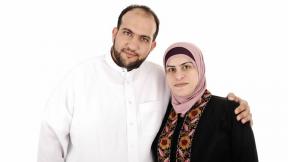
1. Organize “In Memory of. Aasiya: Domestic Violence Awareness Day”
Get together a couple of Imams, leaders, mosques and Islamic centers in your city and organize a city-wide “In Memory of Aasiya: Domestic Violence Awareness Day”, This would feature Khutbas and speeches by both men and women leaders from the local Muslim community, workshops on domestic violence awareness at local Islamic institutions, as well as the distribution of multilingual information about this form of abuse in area mosques, Islamic centers and Muslim institutions.
2. Audit Yourself for Domestic Violence
You many not be physically beating your spouse but verbal abuse can lead to physical abuse. Verbal abuse is also prohibited by the Prophet Muhammad, peace and blessings be upon him. Verbal abuse occurs where there is a deficit of mercy and forgiveness. The low level of mercy points to a low level of love or an absence of communication. So let’s do a self-audit in our own homes:
Start by saying praises to the Merciful God who says He has ninety-nine times more mercy than mothers and remembering that the Prophet did not raise his hand against anyone. Period. Ask yourself the following questions about your relationship with your spouse:
- How is our communication?
- How is our expression of love?
- How are we doing in terms of mercy and forgiveness?
- Is there any verbal abuse in the relationship?
- Is silence being used as a weapon?
Once you have done this personal audit, make dua for forgiveness from Allah if you feel it is required and then sit down with a pen and a paper to plan for a better life.
3. Name something after Sister Aasyia
Aasiya Zubair was a leader. She was the one who thought of the idea of starting a television station to correct the image of Islam and Muslims in the media. She was named Aasyia after the wife of a Pharoah who took care of the Prophet Moses, peace be upon him. She is considered among the four best women of the world by the Prophet Muhammad, peace and blessings be upon him. So name something after her: a baby; a food pantry; a new not-for-profit organization; a sisters’ Halaqa (Islamic studies circle); a. new media project; a Masjid; a school; a scholarship.
4. Stop ignoring a situation involving domestic violence
If you know of a woman who is being abused by her husband physically, verbally or emotionally, then start helping her today.
You may not be ready to confront her abuser. However, one of the first and most important steps you can take is to reach out to her. That means keeping in touch on a regular basis. One thing abusers do is isolate their victims by cutting off their relationships with the outside world, particularly with family and friends. By keeping in touch, you can literally be a lifeline by alerting authorities if her situation becomes deadly.
What’s more likely to happen though is that by slowly breaking the isolation, you will help the abused woman gain the strength and support she needs to take a stand and get out of the abusive situation.
5. Insist that your Imam talk about domestic violence, using Sr. Aasiya Zubair’s example or Sr. Shahpara Sayeed who was burned alive
Call, email or snail mail your local Imam and discuss the need to have a Khutba about the Islamic perspective on domestic violence. Offer him specific points and insist that he use Aasiya Zubair’s case to show a practical example in the Muslim community.
If your Imam does not respond, arrange an in-person meeting with a delegation and make sure to include some brothers to show this is not a “women‘s“ issue but a community issue. If that doesn’t work, keep contacting Imams in your city until you find one or more who are willing to give at least one Khutba on this topic.
6. Make collective Dua for Aasiya Zubair and all victims of domestic violence
Make this the closing of the Friday Khutba on this topic, as well as all related events.
7. Make this excellent directory available in every mosque and for all abused women in your community
Last year, the Muslim Women’s League, in collaboration with the Peaceful Families Project, put together a directory of “Domestic Violence Programs for Muslim Communities” which is available here: http://www.mwlusa.org/DV.Services.For.Muslim.Women-Directory-09.2009.pdf
Make sure this is on the desk of every Imam and Muslim community leader in your city, as well as any woman you know who is being abused.
8. Contact a women’s shelter or help hotline and see if you can volunteer
This may be emotionally trying and is not for everyone. If you don’t think you can bear the sadness and pain, at least help the shelter or hotline with your money by making a small, monthly donation to support their work.
9. Seek and distribute multilingual information about domestic violence
There is information available online and through various social services agencies about domestic violence in Arabic, Urdu, Somali, Bangla, Punjabi and many other languages. Get these pamphlets and put them in the women’s section of every mosque in your city, as well as in the main areas usually frequented by men.
If you cannot find information in the language you need, arrange to have it translated, published and distributed. Consider this your major project for year 2010, one that could very possibly save the lives of women and children suffering pain and abuse.




Comments
Please use the Qu'ran for references instead of quotes like Allah said he has 99 more merciful names than mothers, or something to that effect. I really do not find those hearsay quotes very helpful, nor an accurate representation of Allah, tho that "quote" probably is meant metaphorically. We need to learn what our Qu'ran actually says instead of these thousands of hadith that do not even find consistency with each other. Many of them are rather archaic and have no place in our study time.. I know you sell many books on hadith so this may fall on deaf ears, but so many of us are still needing to learn what is truly in the Qu'ran and what is not, and the confusion can cause dissention among the believers. Thank you for your interesting and caring article.
Location
Add new comment